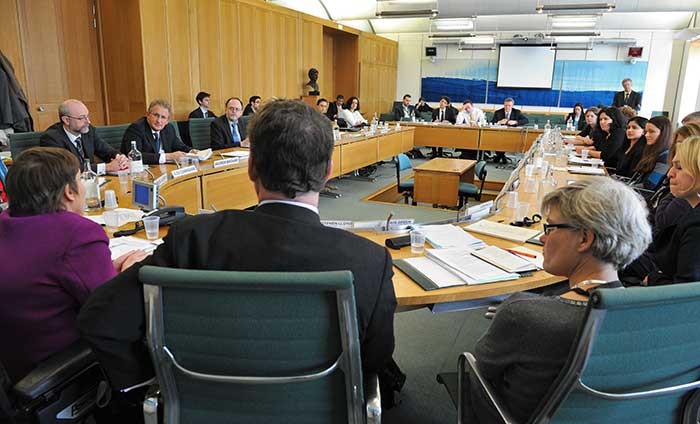
Photo: Catherine Bebbington/Parliamentary Copyright
In a report looking at the work of select committees in the last parliament, the IfG said there had been innovations since 2010, including the introduction of elections among MPs to determine the chairs. Other reforms included the defence committee’s use of rapporteurs to gather evidence and the home affairs committee’s speed in holding oral evidence sessions in reaction to news events.
However, the Select Committees under Scrutiny report stated further reforms were needed to ensure that scrutiny provided good value for the taxpayer. “It should not be taken for granted that committees will continue even to maintain their current level of impact, let alone increase this, without those involved paying attention to how this can be achieved,” the report stated.
Among the recommendations for the committees, whose chairs are to be elected next week, was a call for them to focus explicitly on impact and outcomes, rather than tasks and outputs.
The report called on committees to clearly identify their aims and then structure their inquiries to deliver them. They should also evaluate the effectiveness of their inquiries once reports have been published.
Chairs should work together to find mechanisms to drive cross-cutting committee work, including actively identifying emerging issues that cover the remit of several committees.
As the House of Commons committees were established to replicate the departmental boundaries of government, the report highlighted that cross-committee working remained rare.
“Committees tend to operate in silos,” the report stated. “They tend towards introspection, pursuing their own programme of work and ignoring that of others even when they are investigating an issue that another committee has already addressed.”
Report author Hannah White said parliament had been able to develop new and effective ways of holding the government to account since 2010, but the system lacked the capacity to reflect on, learn from and build upon these innovations.
“Too often, committees don’t create the impact they might hope because they aren’t clear what they want to achieve,” she said.
“The home affairs committee might have been proud of its role in the abolition of the UK Borders Agency – but did that improve outcomes on immigration? The defence committee avoided an inquiry on Trident because it knew it wouldn’t agree on a report – ignoring the value there would have been in the inquiry process even if no report had been published.”
Former MP Tony Wright, who chaired the public administration select committee from 1999 to 2010 and helped design the system of select committee elections, said the report laid out “the necessary next stage in the progress of select committees”.
He added: “The committees are good at asking questions of others, but they need to be as good at asking questions of themselves. This report identifies the sort of questions they should be asking, and how they might find some of the answers. It should be read by all those who care about the scrutiny role of select committees – and then acted on.”




















